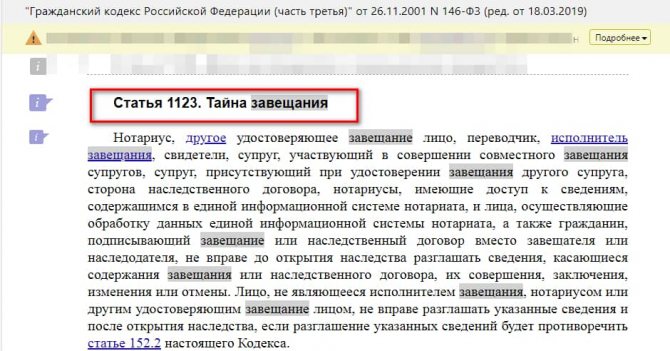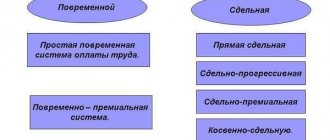In what cases it is impossible to challenge
A will is a one-sided agreement that comes into force after the death of the testator. Such a document is not disputed during his lifetime, with the exception of a joint document drawn up by spouses, if the claim was drawn up by one of them.
It is impossible to challenge a will that does not violate legal requirements.
You cannot challenge a document if the will of the deceased is not liked by the heirs, and also if:
- The paper is notarized or signed by the responsible person (chief physician, captain of the ship, supervisor and other official).
- The paper does not infringe on the rights of other persons and future heirs in the transfer of property rights.
Evgeniy Baidalin
Practicing lawyer in civil and arbitration cases. More than 8 years of experience
Ask a Question
The presence of typos, blots, and minor violations when writing it is not a significant basis for the court.
How to draw up a will without it being contested
To challenge a document, an heir or other person must have compelling reasons. Such circumstances include violations of the Civil Code of the Russian Federation, the presence of formal errors and other factors. In addition, if a person proves that the testator signed the testamentary document under duress, it will be revoked.
Regardless of the reason, the procedure for challenging is as follows:
- The citizen must find evidence that there are grounds to revoke the will of the deceased.
- Consult with an attorney to understand your chances of success, develop a strategy, and prepare your claim.
- Collect facts and evidence that will be needed to support your position and arguments. Certificates, certificates and legal documents can be used as evidence.
- File the claim in the district court.
How to Avoid Contestation
First of all, you need to thoroughly prepare. You should not rush to draw up a will after every family quarrel in order to manipulate relatives. If you want to correctly draw up a document that cannot be appealed under any circumstances, use the help of inheritance lawyers. The notary will take into account all the norms of the law, draw up the document correctly, and certify it. In this case, it will be extremely difficult to challenge the document.
When can a will be contested?
It is possible to draw up a statement of claim and challenge the will of the testator if the document violates the rights and legitimate interests of a citizen. The heir or the person mentioned in the previous will has a similar right .
The heirs may invalidate the entire will or a separate clause in court if:
- the document does not take into account heirs who, by law, can count on their obligatory share: spouses, children, parents, dependents;
- the court ruled that the citizen was incompetent when drawing up the document;
- the testamentary document is forged;
- the list of property recipients contains unworthy heirs;
- The document is not drawn up according to form. By law, a will is made in writing, then certified by a notary or other certifying person, and also signed by the maker who is fully aware of his actions;
- it turned out that at the time the official document was drawn up, the testator was threatened;
- a will was drawn up by a citizen aged 14-18 without the consent of legal representatives.
Evgeniy Baidalin
Practicing lawyer in civil and arbitration cases. More than 8 years of experience
Ask a Question
In addition, there is a chance to challenge a will if the will of the deceased can be interpreted in two ways, if the document is not certified by a notary or changes were made to it by authorized persons after its certification.
Who has the right to challenge the last will of the deceased?
Conflicts between heirs are a common occurrence. Situations like these may make it necessary to challenge or revoke the will. The legislation clearly defines the list of citizens who can initiate the process.
The first thing the law relies on is the order of succession and the right of an individual citizen to the main share. Heirs of the first priority: spouses, children, parents, as well as those people who, by law, cannot be refused to accept an inheritance, have a similar right.
Another criterion that also matters is the required share. It is its size that often causes difficulties for people who plan to challenge the will of the deceased.
The right to receive the obligatory share is with:
- children of the deceased, regardless of their age, if they have a disability status;
- dependents, as well as disabled and elderly parents.
Evgeniy Baidalin
Practicing lawyer in civil and arbitration cases. More than 8 years of experience
Ask a Question
Both categories, regardless of the terms of the will, will receive at least 50% of the portion due by law.
How long does it take to appeal?
The document can only be contested after the death of the owner . Until this moment, the paper has no legal force. By law, property rights cannot be transferred under a will until the death of the testator. This right applies only to deeds of gift.
Drawing up a testamentary disposition is a secret procedure. The information contained in the document must be kept secret until the death of its owner. In cases where the heirs find out the contents of the will in advance, they will not be able to go to court.

The heirs have 3 years from the date of entry into force of the testamentary disposition. Once the statute of limitations expires, it cannot be considered void .
The most optimal period is considered to be six months from the date of death of an individual. At this time, the heirs specified in the will have the right to take possession and dispose of the inheritance at their own discretion. Including, making purchase and sale transactions that greatly complicate the contestation procedure.
In situations where a will was drawn up under pressure or violence, a person can contact the police or prosecutor's office. He has one year from the date of disclosure of circumstances proving violent acts against the applicant.
Grounds for challenge
To invalidate a document, a citizen must have evidence. The presence of small typos or typos is not grounds for cancellation of the paper.
General and special grounds are specified in the Civil Code of the Russian Federation. General grounds are the reasons due to which any citizen of the Russian Federation can protest any agreement if it was concluded in Russia.
Special grounds imply certain cases in which a will may be declared invalid.
Chapter 9 of the Civil Code of the Russian Federation applies to general principles. You can challenge a document if:
- The will was drawn up by an incapacitated citizen.
- The testator was deceived or misled. The citizen did not realize what civil consequences would arise after drawing up the order. For example, he might think he is signing a lease or sale. Sometimes criminals slip gullible people a form of will that is beneficial to them, reinforcing the good will of the testator with various benefits or, conversely, blackmailing and threatening him.
- The paper was written by a citizen who is not aware of his own actions. This includes: people on drugs, those suffering from dementia and those who are drunk.
- The recipients of the inheritance suspected that the document was falsified. For example, it turned out that a document was signed by an outsider, the signature was forged, etc.
- A document containing a person's will invites heirs to actually break the law. For example, the will specifies real estate that does not belong to the testator.
For the reasons listed above, it is almost impossible to challenge the transaction. The reason is that the will is certified by a notary, who must verify the legal capacity of the owner and explain to the client the consequences of his actions.
However, if the will is drawn up in an emergency situation, violations are very likely. To make it impossible to challenge, the paper is certified by the chief doctor, the warden, the head of the locality and other responsible persons. They have little understanding of laws related to inheritance law. It is this lack of knowledge of legal norms that leads to inaccuracies in the will.
Special grounds are prescribed in Art. 62 of the Civil Code of the Russian Federation. These include:
- failure to comply with the standard form prescribed by law. The document does not contain the citizen’s signature, the date of its preparation or the notary’s visa;
- a document containing property that does not belong to the testator;
- the paper was drawn up in front of strangers, interested parties and other unreliable witnesses;
- the paper was drawn up without witnesses.
In addition, the presence of “unworthy” persons in the list of heirs is also considered a basis for appealing the document. If they exist, the will will be revoked.
Unworthy heirs include:
- a person who has committed a crime against the testator or his successors, in order to increase his own share in the inheritance or to obtain all the property of the applicant. The measure is effective against both murder and fraud;
- a person was deprived of parental rights, but his child still made a will in his interests;
- the recipient of the inheritance did not fulfill his obligations to maintain and care for the testator. For example, he could not pay child support or ignore his responsibilities to care for a disabled person.
Where are such cases heard?
A will can be annulled and refuted in a court of general jurisdiction (district court). Cases are considered at the place of registration of the defendant or at his location if the defendant is a company.
If a dispute arises about inheritance, the claim is considered at the place where the disputed object is located . If there are many similar objects, and they are all located in different areas of the city or regions, a general claim can be brought at the location of any of them.
Question for a lawyer
What is more difficult to challenge a deed of gift or a will?
Sometimes old people, not wanting strife between their heirs over an inheritance, draw up not a will, but a deed of gift. The first document assumes that the property will pass to the heir after the death of the deceased. The second implies a change of owner “here and now”, provided that the gift is transferred free of charge and, unconditionally. A deed of gift is drawn up during a person’s lifetime. The agreement must be registered. You cannot issue a deed of gift with conditions. A fictitious “deal” can be challenged in court. In fact, both agreements are transactions that, if there are grounds, can be challenged. In my opinion, I think that it will be more difficult to challenge the will, since the testator will no longer be alive. Thus, this fact will complicate the procedure for proving controversial issues in court.
Procedure for changing and canceling a will
The procedure for canceling a will is prescribed in Article 1130 of the Civil Code of the Russian Federation. A citizen can make changes to his will an unlimited number of times during his lifetime.
Moreover, each subsequent document will completely or partially cancel the previous one. There are the following ways to revoke a will:
- direct cancellation;
- indirect cancellation.
Direct cancellation presupposes the presence of unambiguous instructions about the loss of legal significance of a previously drawn up document. It can be implemented by directly canceling previous articles in a new will, or through the execution of a special order.
In case of indirect cancellation, there is no direct instruction from the citizen to cancel the previous will. In such a situation, the contents of the new will contradict the previously drawn up document, therefore the law gives preference to the last will based on the date of preparation.
The nature of the changes can be of two types: changes in the composition of applicants for property (removing someone or adding new participants), redistribution of the rights and obligations of the parties (changes in shares, burdening inheritance rights with additional conditions).










